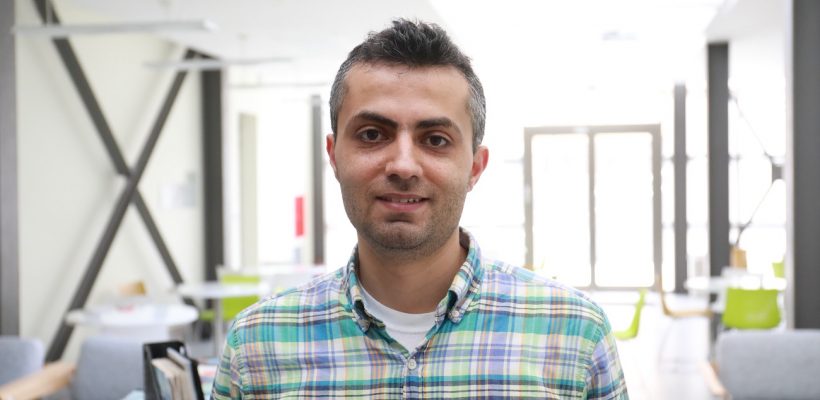
Alumni Success Story: Vahe Khachadourian (MPH ’11) Receives Awards
4 min readThe American University of Armenia (AUA) is proud to share that Dr. Vahe Khachadourian (MPH ’11), assistant professor at the Turpanjian School of Public Health (SPH), received 2019 AUA Faculty Teaching Excellence Prize at the University’s twenty-seventh graduate commencement ceremony. Earlier in May, he was notified of another award by the Fielding School of Public Health of the University of California, Los Angeles (UCLA), where he recently earned his PhD. He will be receiving the 2019 Dean’s Outstanding Student Award in Epidemiology, established to honor a top graduating student from each department. Dr. Khachadourian found time in his busy schedule to answer our questions. You can read his interview below.
Tell us about your background.
I was born in Tehran, Iran, and then moved to Armenia after completing high school when I was 17. I came here to study at the Yerevan State Medical University. My first exposure to AUA was during the first or second year in Armenia. I was actually taking English courses at AUA when I learned about the MPH program. So, when I was in my fifth and sixth years at the Medical University, I also enrolled in the MPH program at AUA to get a second degree at the same time.
You have studied in three different universities both in Armenia and abroad. Please compare your educational experience there.
Comparing Yerevan State Medical University and AUA, I can say that it’s a very different experience. Here, at AUA, the quality of education, the facilities, and the faculty all adhere to very high standards. And of course, that brings a very different rewarding experience which is very rare in other institutions, I would say not only in Armenia but perhaps in the region. I think, an AUA education is something very unique that people are fortunate to access in Armenia.
At the beginning of my PhD studies at the UCLA Fielding School of Public Health, I was very anxious and nervous because most of my peers in the PhD program came from very well-known U.S. institutions and I wasn’t sure if my knowledge and skill set would be on the same level as theirs. But I was pleased to learn that actually the education that I got at AUA and also through my research experience at the Center for Health Services Research and Development within the AUA School of Public Health prepared me very well for PhD studies. So I did not have any problems at UCLA. There I realized that AUA with its high quality of education is comparable to top institutions in the U.S.
What research interests do you have? Tell us about the projects you are currently involved in.
My research interests include comparative effectiveness research and causal inference using data from observational studies. I have been involved in various research studies as a graduate student researcher and have served as a teaching assistant and teaching fellow in several graduate and undergraduate level courses at the UCLA Fielding School of Public Health. Right now, I am leading a Tuberculosis project funded by USAID. My interests also lie in health outcomes after natural disasters. I am exploring the opportunity for doing another follow-up study of Spitak earthquake survivors in the near future.
You are going to receive the Dean’s Outstanding Student Award in Epidemiology on June 12. Tell us about your PhD research at the UCLA Fielding School of Public Health.
My PhD research was on the mediating effect of post-disaster experiences on long-term health outcomes among the 1988 Spitak earthquake survivors. It was built on the research that I did at AUA. Dr. Haroutune Armenian had initiated this cohort study after the 1988 earthquake. Then during my MPH studies at AUA I wrote a proposal, we received funding and successfully implemented another wave of follow-up survey among the earthquake survivors. That was in 2012. Since then I have worked more on the database, analyzed the outcomes and published several papers. In my PhD thesis dissertation, I used several advanced modelling techniques and computer simulations to project the effects of various hypothetical interventions among the earthquake survivors, such as providing housing to them, and preventing job loss in the aftermath of the earthquake.
What are your feelings as the recipient of the AUA Faculty Teaching Excellence Prize?
This prize is very special to me. This is an award that would make any faculty member feel extremely rewarded and honored. But for me it’s even more special. I don’t only accept this award as an AUA faculty but, in fact, I perceive this primarily as one of the many AUA alumni successes and achievements. Of course, this would not have been possible without the rigorous training and mentoring that I have received during my education and teaching career both at AUA and UCLA. On that note, I would like to share this prestigious award with my professors, mentors, and also now colleagues and friends who have had a significant impact in my personal and professional development and growth – Dr. Varduhi Petrosyan, Dr. Haroutune Armenian, and Dr. Onyebuchi Arah of UCLA.
What’s your advice to current AUA students?
The key to growth and prosperity is education. Stretching the minds of the next generation and expanding their reach through new knowledge and experience prepares them to believe in themselves, to push the boundaries and to excel. That is what my education has given me and that is how I approach my students today.
My advice to AUA students would be to believe in themselves. They need to use this opportunity of receiving a high-quality education at AUA, not necessarily to become a faculty member but to continue the trajectory that they would like to pursue and also to achieve the goals they have set for themselves.
